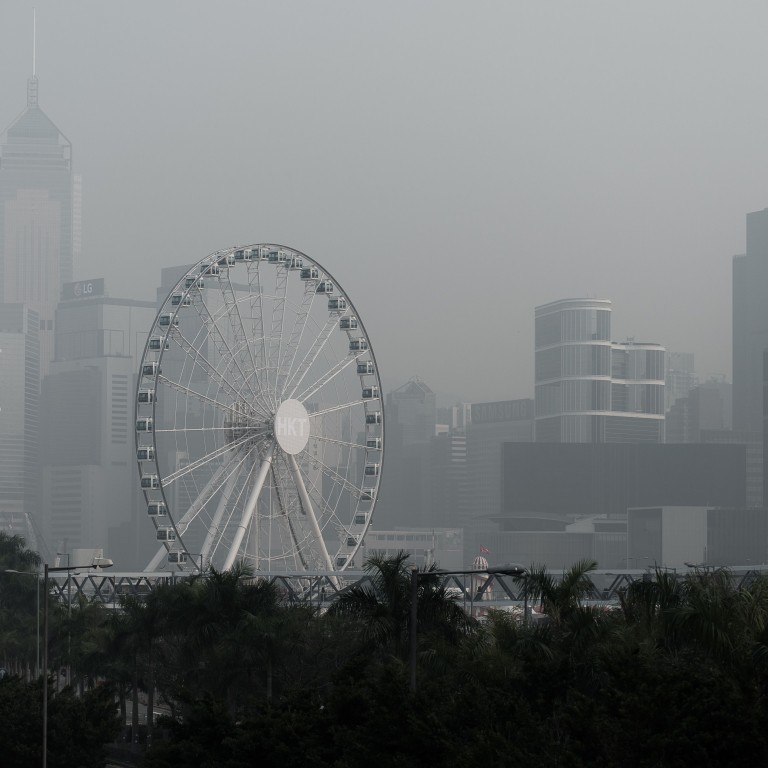
Confidence in Hong Kong undermined by air pollution, handling of Occupy movement
Singapore does well because whatever their well-publicised restrictions, the government has an image of being business friendly and of rarely moving the goalposts
In Beijing last week, I gasped through an air pollution index of 540, breathing air that tasted of coal dust.
That made me think – how does Hong Kong’s atmosphere, measured by the US Environmental Protection Department’s Air Quality Index (AQI), compare to that of our nation’s capital?
The answer was breath-taking. In the last two months, according to the smartphone app, Airpocalypse, the AQI at the Central roadside meter has exceeded that of Beijing (measured at the US Embassy) a third of the time.
As I write, we have a clear day in Hong Kong, with an AQI of 64; but at the same time, Beijing is 46. The AQI definition of "good air" stops at 50.
Since November, that level has been exceeded in Hong Kong 96 per cent of the time (Beijing 93 per cent), putting children, people with lung diseases such as asthma, diabetes, heart or circulation problems, over 65’s, or those who exert themselves outdoors, to lose some lung function.
The general public becomes affected over 150 and masks are recommended over 200. The index officially stops at 500, but can still be calculated though human life becomes less and less sustainable.
It is true that Beijing has consistently higher ratings than Hong Kong, with over 7 per cent of days over 200; while we had none. But we did have 38 per cent of days over 100 (Beijing 73 per cent) - hazardous for many.
Beijing has the good fortune to have occasional beautiful blue sky days, assisted by high winds or the government sending ’stop working’ texts to factory owners before International Marathons or APEC meetings.
Our clear air atmospheric events are limited to the occasional influx of warm South China Sea air sucked in by monsoons or typhoons, mainly in the summer.
So the myth about Hong Kong having cleaner air than most of China is been blown away - and as the closed roads during Occupy Central showed, we produce a lot of pollution ourselves.
In November, the daily AQI averaged in the 80’s; since then in the 100’s.
We could tax polluting diesel fuel or require Hong Kong-owned power stations to operate to the highest emission standards.
If Europe is able to reduce its pollution emissions by nearly 50 per cent since 1990; there is no reason that a rich city like Hong Kong should not enact similar regulations. The Scheme of Control by which transport and utility franchises are run here makes it easy to enact because they will make no less profit.
It is a sad fact that "dirty air" is used by Singapore to persuade our businesses to relocate there.
The fact that it is costing our economy dear is reinforced by an annual survey of top cities for expatriate workers released by the firm ECA International. Hong Kong last year fell from 17th to 33rd place - down a massive 16 places.
Annoyingly, Singapore holds the top spot as it has done for the last 16 years.
The poor air quality, plus heightened uncertainties surrounding the handling of Occupy Central, has undermined confidence in Hong Kong.
The nebulous perception that the government is seeking to clamp down on personal freedoms, along the lines of restrictions on the mainland, is a fear - in ignorance of the fact that Hong Kong boasts probably the freest, most laissez-faire society in Asia.
These perceptions are worth billions to our economy.
Singapore does well because whatever their well-publicised restrictions, the government has an image of being business friendly and of rarely moving the goalposts.
In Hong Kong at the moment, business people just don’t know how the pitch is to be marked out. The response is to play safe, like the Cheung Kong Group’s recent move to the Cayman, led by their astute leader, Li Ka-shing.
However, economics rarely flows one way.
Last week, I heard several experienced and wealthy Mainland businessmen explain why they had moved their families to Hong Kong.
The reasons included the fast internet, which was slightly ironic as they were all involved in new era digital businesses. The World Wide Wait persists in China as Internet speeds have been dulled by censorship.
The same business leaders also cited better medical treatment, clean air for the family (irony again!), and their number one requirement - the rule of law.
So perhaps as one group of business people leave, another will take their place.
As Joni Mitchell sang, “you don’t know what you’ve got,‘till its gone”

